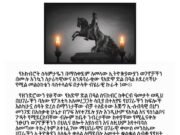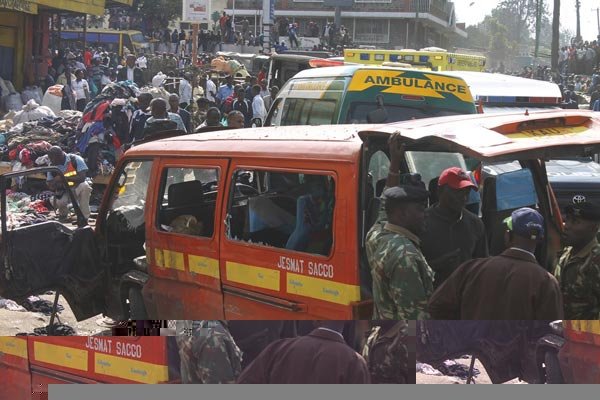The aftermath of twin blasts at the popular Gikomba market in Nairobi, where 12 people died and 78 others were injured on May 16, 2014. The attacks happened a day after the UK government started evacuating its citizens from Mombasa over insecurity.
By ZADOCK ANGIRA & By THOMAS KARIUKI (DAILY NATION)
Two terror suspects were arrested after twin explosions left 12 people dead and more than 78 injured in Gikomba market, Nairobi, on Friday.
The attack came as panic spread through the international community, with Britain evacuating more than 600 tourists mainly from Mombasa and cancelling, with immediate effect, all scheduled flights from that country until October 31, this year.
The Kenya Tourism Federation estimated the loss expected after the cancellation of tourist arrivals at Sh5 billion and accused the government of not taking adequate measures to deal with terrorism.
President Uhuru Kenyatta, who spoke a few minutes after the twin explosions, called on the international community to instead work with Kenya to tackle what he described as fast-rising worldwide evil.
Four people died instantly and more than 80 others were injured in the back-to-back explosions at the crowded Gikomba market shortly after 2pm, a few metres from the Machakos Country Bus Station.
Eight more succumbed to injuries at Kenyatta National Hospital (KNH).
Police said the blasts — two minutes apart — were caused by improvised explosive devices.
Nairobi County Police Commander Benson Kibue said detectives were questioning two people arrested at the scene by the public shortly after the blast.
BUYING SECOND-HAND CLOTHES
“They were positively identified and they are in police custody,” he said.
Police had, however, not linked the two suspects to the attack. Accounts of eyewitnesses interviewed by the Saturday Nation were contradictory, but police maintained that they were holding “the key suspects”.
The two were apprehended as they tried to escape amid the confusion that befell the unsuspecting shoppers.
The first blast went off near a structure where people were buying second-hand clothes. Two men and a woman were killed instantly while 30 others were injured.
A matatu belonging to Jesmat Sacco, which was carrying passengers next to the makeshift structure, was wrecked by the impact that left the passengers with shrapnel injuries.
As the public fled towards Pumwani Road, another blast went off about 70 metres away. One person was killed and 40 others injured in the blast. The two explosions left two holes about 30 cm deep and 45cm wide on the ground.
Police had a difficult time controlling the crowds at the scene.
Second-hand clothes — some soaked in blood — were strewn all over the place. Others hung on the overhead electricity cables.
Mr Fred Majiwa from the Kenya Red Cross confirmed that dozens of people were injured in the explosions and were taken to Kenyatta National and Guru Nanak hospitals.
Mr Stanley Karanja, owner of a kiosk next to the scene of one of the explosions, said that when he heard the blast, he thought it was a tyre burst.
“Then I heard the second explosion, only that this time it was louder than the first one. I saw people lying down, some of them bleeding,” he said.
Preliminary investigations showed that the attackers targeted people who frequent the busy market to buy clothes and food.
The rear windscreen of a white saloon car parked next to a structure where one of the devices went off was shattered.
Another businessman, Mr Peter Ndegwa, who was unhurt, said the assailants were dressed normally.
“I sell shoes next to my friend who has just passed on; he was killed by the explosion.”
A statement from Kenyatta National Hospital chief executive Lily Koros Tare said: “Patients sustained multiple fractures and shrapnel injuries. Eight patients have died (four men and four women).”
Seven patients were transferred to other hospitals with Aga Khan Hospital taking four, Nairobi Hospital two and Mater Hospital one, leaving 69 at the country’s premier referral hospital.
PHOTO | ISHMAEL AZELI NATION MEDIA GROUP

























